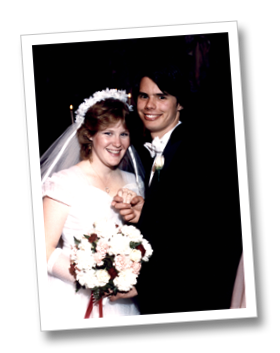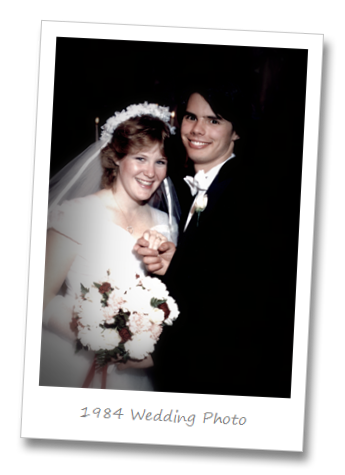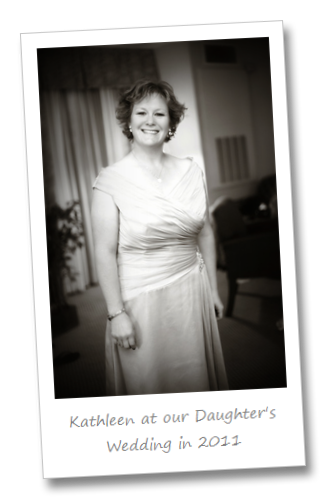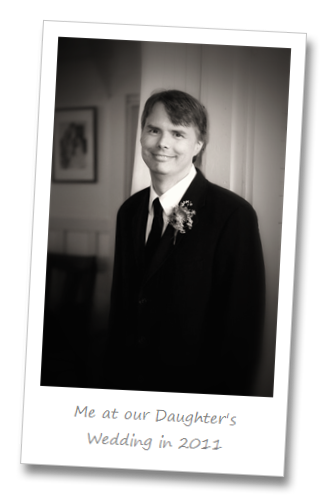A Few Thoughts on My 40th Wedding Anniversary
29 December 2024 • by Bob • Marriage
Today my wife and I celebrate our 40th wedding anniversary, which is no small feat by any stretch of the imagination. Together she and I have faced more than our share of triumphs and tragedies, prosperity and poverty, happiness and heartbreak. This year we joyfully greeted our fourth grandchild, while bidding a tearful goodbye to my wife's brother and aunt and my father. When my wife and I both said "I do" all those years ago, we were mere children ourselves, blissfully blinded by the stars in our eyes from the realities that lay before us. Side by side we survived eight years of Cold War deprivations during my time in uniform, followed by almost 30 years of my wife's career as a nurse and my never-ending adventures and misadventures with Microsoft. Through it all, however, she and I have trod the path before us hand-in-hand, and words cannot do justice to how much my wife makes everything better in life.

Perhaps the great Irish poet, Thomas Moore, expressed it best when he penned the following verses:
Believe me, if all those endearing young charms,
Which I gaze on so fondly to-day,
Were to change by to-morrow, and fleet in my arms,
Like fairy-gifts fading away,-
Thou wouldst still be ador'd as this moment thou art,
Let thy loveliness fade as it will;
And, around the dear ruin each wish of my heart
Would entwine itself verdantly still!
It is not while beauty and youth are thine own,
And thy cheeks unprofan'd by a tear,
That the fervour and faith of a soul can be known,
To which time will but make thee more dear!
Oh! the heart, that has truly lov'd, never forgets,
But as truly loves on to the close;
As the sun-flower turns on her god, when he sets,
The same look which she turn'd when he rose!
When in Rome
27 April 2023 • by Bob • Humor, Travel, Marriage
Let me tell you a funny story that I heard about the train station in Rome:
Once upon a time, there were two travelers in the Roma Termini who were on their way back from a long day in Pompeii, and they were changing from the cross-country trains to the metro. They had passed through that same station earlier that day, and one of the travelers noticed that the path they took through the station seemed unnecessarily long. However, he also noticed that there was another path they could take through the station, which seemed as though it would reduce their walking distance by hundreds of meters. When this first traveler suggested that they take a different route through the station, the second traveler said she didn't want to take the risk that an alternate path might take them too far out of their way. The first traveler said that he was 99% sure that his suggested route was shorter, but he couldn't guarantee his suggestion with 100% certainty, so the second traveler wouldn't yield.
Unbeknownst to the first traveler, the second traveler had an ulterior motive for her unwavering skepticism: they had been traveling all day in the hot sun, and she needed to use the little traveler's room, so she didn't want to waste a bunch of time wandering through a train station if the first traveler was mistaken. However, the second traveler didn't say that she needed to use the little traveler's room, so the second traveler seemed to the first traveler like she was being overly difficult for no discernible reason, while the first traveler probably seemed to the second traveler like he was being an insensitive schmuck.
With a not-so-subtle tone of exasperation, the second traveler told the first traveler something like, "You can do whatever you want, but I'm going to follow the route that we used earlier." The first traveler took the second traveler's statement as a challenge, so he left to pursue his shorter path through the station - which worked out exactly as he had expected - and because he was also more than a little exasperated with the second traveler, he boarded the metro without the second traveler.
The first traveler pouted all the way back to his hotel, where he arrived around a half hour before the second traveler. However, the reason why the second traveler arrived later wasn't because she needed to use the little traveler's room; she boarded a different metro car because she had the first traveler's metro pass, and she spent that half hour unsuccessfully searching the metro station in a desperate attempt to find the first traveler, which delayed her departure. However, unbeknownst to the second traveler, the first traveler had put aside his sulking long enough to buy a one-way ticket on the metro to get back to their hotel.
The moral of this little tale? Don't be so secretive when you need something, and don't act like an insensitive schmuck when your traveling companion doesn't agree with you.
Nothing in that story has anything to do with my wife's and my recent journey to Rome, of course. We always made it safely back to our hotel. Perhaps we arrived together. Perhaps we didn't. Perhaps one of us arrived a half-hour after the other, but that doesn't mean anything, does it?
![]()
The Ups and Downs of Illnesses
21 February 2019 • by Bob • Health, Marriage
I've had a cold for a few days now, and as of last night I lost my voice. (My wife, Kathleen, thinks this is an improvement in our relationship.)
Fun fact: when my voice disappears, so does my ability to cough loudly, so I sound like a dog's squeaky toy whenever I have to cough. (It's amazing Kathleen isn't laughing harder at my expense.)
![]()
Cow Chip Cookies on Valentine's Day
14 February 2019 • by Bob • Marriage
My wife special-ordered heart-shaped Cow Chip cookies for me for Valentine's Day. If you've lived in the Seattle area and you don't know about these cookies, then either a) you've been living under a rock, or b) you're dead.
PS - They were great, and yes - I shared.
Gaffes of the Galaxy
02 December 2018 • by Bob • Marriage, Humor, Christmas
My wife was shopping for Guardians of the Galaxy toys to donate to charity, and the following conversation took place:
| Kathleen: | So, I was going to buy Star Lord, Groot, and Ranger. |
| Me: | Ranger? |
| Kathleen: | Yeah, you know - the squirrel. |
| Me: | You mean Rocket? The raccoon? |
| Kathleen: | Yeah, that's the one. |
| Me: | o_O |
Why I Fail To Understand Women
24 May 2017 • by bob • Humor, Ponderings, Marriage
No woman in her right mind would want to be called a "Cow," and yet so many women shop at a place called the "Dress Barn."
This makes no sense to me... ![]()
The Importance of an Apology
23 April 2016 • by bob • Family, Marriage
A friend of mine recently shared the following article on Facebook about a study that was just published by Dr. Roy Lewicki and others at the University of Ohio on the subject of what constitutes an effective apology:
The Six elements of an Effective Apology, According to Science
While the information contained in Dr. Lewicki's study is certainly relevant, it is more or less a rehash of the material which Dr. Gary Chapman presented in his book The Five Languages of Apology: How to Experience Healing in All Your Relationships, which was published ten years ago.
Five of the six points in the OSU study's "new research" are directly lifted from Dr. Chapman's points - and they are almost verbatim quotes. To show just how closely Dr. Lewicki's points are to Dr. Chapman's, I will present the OSU study's list in the first column below, and then I will present the matching points from Dr. Chapman's book in the second column:
| OSU Study | Dr. Chapman's Book |
|---|---|
| 1. Expression of Regret | 1. Expressing Regret |
| 2. Explanation of What Went Wrong | n/a |
| 3. Acknowledgment of Responsibility | 2. Accepting Responsibility |
| 4. Declaration of Repentance | 4. Genuinely Repenting |
| 5. Offer of Repair | 3. Making Restitution |
| 6. Request for Forgiveness | 5. Requesting Forgiveness |
That being said, the OSU study ultimately draws the wrong conclusions; the OSU study suggests that there is one formula for apologies which works in all situations, whereas Dr. Chapman's book demonstrates that what is most-important in an apology for one person may not be for another.
For example, taking responsibility is of paramount importance to me, but not so much for my spouse. However, requesting forgiveness is extremely important for her, and yet Dr. Lewicki suggested that you could leave out the request for forgiveness entirely. If my wife and I were to follow the OSU study's recommendations, she and I would be apologizing to each other in ways that do not align with the other's communication needs, which will undoubtedly result in additional strife at a time when effective communication is most critical.
In contrast to the OSU study's conclusions, Dr. Chapman's recommendation is that each partner in a relationship learn their partner's expected form of apology and strive to address their partner's needs when expressing their apologies. Attempting to pigeon-hole the communication requirements for every relationship based on a single formula as the OSU study suggests is ludicrous.
So ultimately the OSU study is heavily plagiarized from Dr. Chapman's pre-existing research, and yet that study still manages to arrive at an incorrect outcome.
A Few Thoughts on my 27th Anniversary
29 December 2011 • by Bob • General, Marriage
When I was a child, there was an excitement that preceded Christmas as it approached each year. I am sure that most everyone knows what I mean by that statement; whether you are longing for Christmas, Hanukah, Ramadan, Kwanzaa, or even if you are an atheist that participates in some form of secularized holiday celebration. There is a sense of childhood excitement that surrounds the season; it could be the gifts, the decorations, the music, or a host of other contributing factors.
In a small way, I experience something like that feeling each week of the year; every Wednesday night for the past decade or so, my wife and I have had "Date Night." I do my best to never schedule anything that conflicts with this tradition; and as each Wednesday comes around, I look forward to going out to dinner or a movie with my wife in something of that same good-natured attitude of child-like expectation that I used to have at Christmas.
Date Night is a recent endeavor for us; which is unfortunate, but somewhat unavoidable. Both Kathleen and I went directly from living at home to being young, married, and poor; and soon after that we became parents. We were great friends in High School and our first year of college, but we jumped forward several years almost overnight; and as a result, we went from being children to being parents with barely a chance to discover who the other person really was.
Please don't misunderstand me - parenthood was a mixed blessing of training and teething, schooldays and sporting events, chaos and concerts, happiness and heartaches; and I would not trade a moment of my joys or sorrows as a parent. (Well, maybe I could do without the memories from one of my daughter's first boyfriends - and he knows who he is. ![]() ) But that being said, Kathleen and I missed out on the opportunity to explore who we were as a couple all those years ago; which is why I enjoy each week's rediscovery that long before I loved my wife, I actually liked my wife.
) But that being said, Kathleen and I missed out on the opportunity to explore who we were as a couple all those years ago; which is why I enjoy each week's rediscovery that long before I loved my wife, I actually liked my wife.
There is a wonderful scene in the musical Fiddler on the Roof where the main character, Tevye, asks Golde, his wife of twenty-five years, "Do you love me?" I didn't fully understand this scene when I was younger; I simply thought that it was amusing.
But in recent years, Golde's responses to Tevye's simple questions have impacted me differently.
"For 25 years I've washed your clothes,
Cooked your meals, cleaned your house,
Given you children, milked your cow.
After 25 years, why talk about love right now?
"For 25 years I've lived with him,
Fought him, starved with him.
25 years my bed is his;
If that's not love, what is?"
I truly loved my wife on the day that we exchanged rings and we both said "I do" before our friends and family. The reasons why I loved my wife on that day are still there: she has an odd sense of humor, we complement each other well, and she is my best friend. But the trials and tribulations that we have endured together over the past twenty-seven years have changed the dynamics of that relationship.
In our marriage vows Kathleen and I promised to love each other for richer or poorer, for better or worse, and in sickness or in health; and we have endured each of those seasons in due course over our many years of marriage. It is precisely that collection of experiences that has bonded us together in ways for which a night out every week could never substitute; in much the same way that veterans of a war are bonded together in a way that supersedes the love between the closest of siblings.
Two years ago, on our twenty-fifth anniversary, I gave Kathleen a framed portrait that contains our wedding photos and the following quote from Mark Twain:
"Love seems the swiftest, but it is the slowest of all growths. No man or woman really knows what perfect love is until they have been married a quarter of a century."
In many ways that sums up my feelings: I loved my wife when I was nineteen for as much as I understood that concept at the time; but now that I am somewhat older, and perhaps somewhat wiser, I love my wife in ways that I couldn't possibly have understood back then. I tell Kathleen every day that she is my favorite person; and because of that, every week may not be Christmas, but just the same - I look forward to spending each week with her all the more.
For My Wife: Growing Old Together
02 February 2010 • by Bob • Family, Marriage
Valentine's Day is just around the corner, which is always an occasion for me to become a little introspective. With that in mind, I remember the days of our courtship when we would promise to love each other forever and to grow old together; yet now as I look back on our lives, I realize that we had no idea what we were saying. We were young and in love and completely clueless about what being in love really meant.
Mark Twain once wrote that "No man or woman really knows what perfect love is until they have been married a quarter of a century," and now that we have passed that milestone I can look back and begin to catch a glimpse of this elusive concept called "true love."
Love has meant staying together through times of destitute poverty when we didn't know from where our next meal would come. Love has meant enduring months of separation when I was serving abroad in our country's armed forces. Love has meant countless sleepless nights raising children and meeting their every need. Love has meant staying by each other's bedside to nurse one another back to health. Love has meant walking side-by-side through that timeless season of joy mixed with pain that all parents must suffer when watching their children grow up and leave home.
Over the years I have learned that true love is not the offspring of well-meant promises made hastily in your youth; true love is borne of a thousand little things over thousands of days and nights as you grow older together, until you find that so much time has passed that you cannot remember a time when you were ever apart.
Will Durant wrote that "The love we have in our youth is superficial compared to the love that an old man has for his old wife," and I have found my greatest joy in growing old with you.





